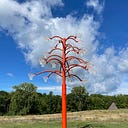Reimagining the Four Questions
It’s the eve of Passover, my favorite holiday. Why favorite? Because the Exodus story at its core is a story of resilience and hope, of new beginnings. The Seder meal is a ritualized practice with family and friends for honoring our Jewish ancestors and recognizing our history of oppression and our liberation.
I’m only alive today to participate in a Seder because my maternal grandparents left Rhodes before WWII (the Jewish population of Rhodes was extinguished by the Nazis), living out the war in Africa, and because my paternal grandparents were sent to America alone as children to escape the pogroms in Eastern Europe at the turn of the 20th century.
This Passover, Jews around the world will have much to reflect on as we navigate a particularly tumultuous and wrenching time. An unexpected and unpopular war drags on in the Middle East, causing terrible suffering, diplomatic strains, and deep divisions among Jews. In just a short time, it has recast how many people view Israel and Zionism. At the same time, antisemitism is surging, White Nationalism and authoritarianism are being mainstreamed, and deep rifts have surfaced in progressive circles and in academia.
In my professional life, I think a lot about democracy and foresight, about the era of instability and disruption we’re in right now, and about our lack of imagination about what could lie ahead. I’ve written frequently about the perils of being too timid in our thinking and holding on too tightly to old paradigms and assumptions. When we do that, we inevitably fail to assess the direst of possibilities but also to imagine the most wonderful, transformational ones, instead charting a course that assumes that the future will look a lot like the present.
So as Passover begins, I’d like to propose an alternative to the usual Four Questions. Rather than wonder simply why this night is different from other nights, shouldn’t we ponder why this epochal time is different from other times and ask how we can use our agency as Jews to make sure our collective future is bright? And since it’s always the youngest among us who asks the Four Questions, shouldn’t we focus on how to shape a world the youngest among us will want to live in, on making sure there will be a world for them to live in and be their whole selves in?
While I’m all for traditions (I always cook recipes handed down from my Sephardic ancestors) and it’s important to remember Pharaoh, Moses and the pyramids, the plagues and the journey through the desert, how can we afford not to ask the questions below when we gather around the Seder table?
The bullied child asks: why am I feeling fearful of people knowing that I am Jewish?
The existentially anxious child asks: what will happen if Jews no longer feel safe where they live and have nowhere else to go?
The young dreamer asks: what does a durable peace in the Middle East look like?
The budding activist asks: how can we bring about a future that is pluralist, abundant, sustainable and free for all people?
At this challenging inflection point for global Jewry, it can be difficult to hold so much pain, uncertainty and fear. Many of us are struggling to find our footing as we gather around the Seder table. May we find comfort in age old traditions and community.
Chag Pesach Sameach to all who celebrate!
[updated April 2024]
